For today only you can feel what it’s like to ride on Southwest Broadway without the threat of someone opening a car door into you, or someone parking in the bike-only lane, or someone squeezing you into parked cars. (Sorry I can’t promise you won’t be right-hooked before you get there.) That’s because a trio of “tactical urbanists” have come together to create a temporary protected bike lane between Salmon and Taylor, just outside the doors of the Hilton Hotel where a smart growth conference is taking place.
“Pop-up designs are such a good concept because they allow cities to use advocates to their advantage and get public buy-in.”
— Ken Snyder, PlaceMatters
For Ken Snyder with Denver-based PlaceMatters, a 10-year old “think tank for civic engagement,” this project was a chance to try pop-up placemaking in a new city. He conspired on the project with local planning consultant Nick Falbo of Alta Planning and Portland’s Better Block PDX. Snyder connected with Falbo after being inspired by his concept for “protected intersections” that’s sweeping the nation. This morning Snyder told me he was impressed with how the City of Portland not only sanctioned the project by helping with permits, but the transportation bureau even did media outreach. “I’ve never seen a city contact the press for us like that,” he said. “We had two TV crews here this morning.”
As with the Better Naito project last summer, the City of Portland embraces these projects because they allow activists to make tangible the things they themselves are too afraid to try. Or, as Snyder puts it. “Pop-up designs are such a good concept because they allow cities to use advocates to their advantage and get public buy-in.” Beyond the political implications of demonstrating what’s possible on our streets, this project has practical goals. (Come to think of it, maybe we should call this stuff “practical urbanism”.)
Planning visionary Nick Falbo said he’s eager to test how various materials work for “rapidly deploying bike lanes and cross-walks.” In use today is a roll of roofing tar paper that’s been painted green. The surface became slippery as rain fell this morning and we watched one man fall over as he tried to pedal up the road. Falbo and Snyder swung into action and pulled up some duct tape that proved to be the culprit. “To be able to roll this out quickly is very exciting,” said Falbo. “What we’re learning today could inform the summer season for Better Block.”
Advertisement
While this temporary bikeway might seem like a one-off, there’s momentum on several fronts that could equal more permanent and more frequent projects like this in the future. Better Block has inked a big partnership with Portland State University to institutionalize their exciting methods, and the City of Portland is planning a multi-million dollar project for real protected bike lanes in the central city (the 10-cent gas tax proposal would set aside another $3 million for it).
And on another level, every time we actively re-imagine our public space it normalizes what at first seems impossible. It’s hard to imagine using an entire blockface of a downtown auto parking lane for a bikeway, until you actually see it with your own eyes.
Speaking of parking spaces, one of the requirements Snyder and Falbo agreed to for their permit was paying for the eight parking spaces on the block. They cost $12 a piece for the day. Add in the $300 in supplies and $300 for the permit and the entire project still comes in well below $1,000. That’s what I call practical urbanism.
That’s cheaper than city-hosted public meetings and surveys. And it’s much cheaper than the status quo.
Roll over and have a look while you can. And when the time comes to support the permanent protected bikeway on Broadway, remember the feeling.
If you’d like to get more involved with Better Block PDX, don’t miss their season kickoff party on Thursday, February 18th at 6pm..
UPDATE, 1:15 pm: It appears that organizers have now taken up the green tar paper due to continued rain and concerns over the slick surface.
— Jonathan Maus, (503) 706-8804 – jonathan@bikeportland.org
BikePortland can’t survive without paid subscribers. Please sign up today.



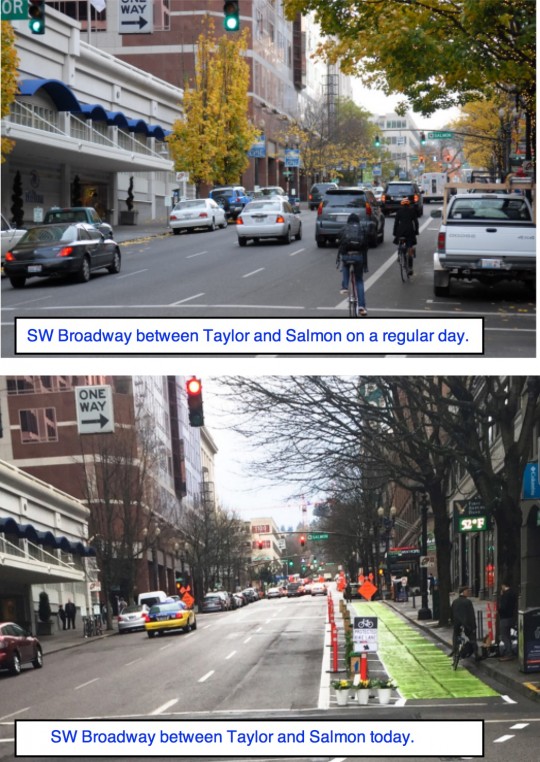
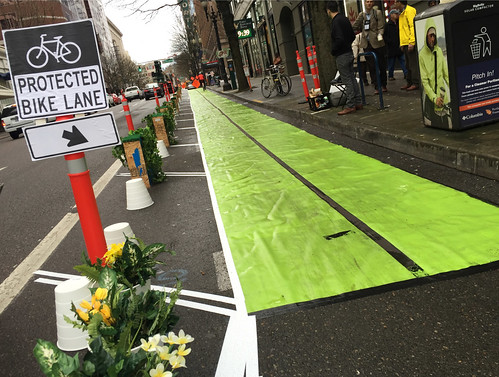
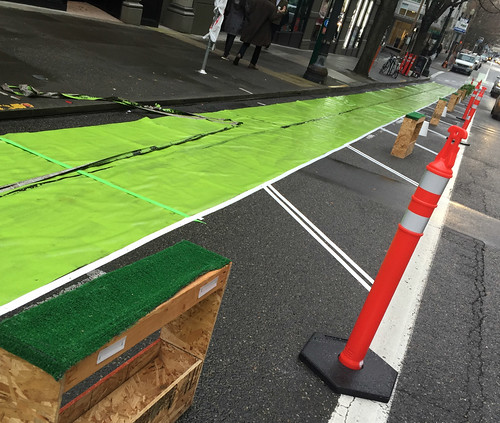
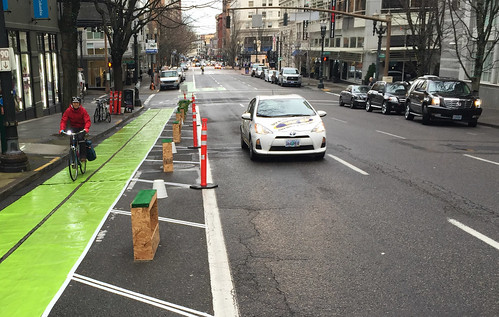
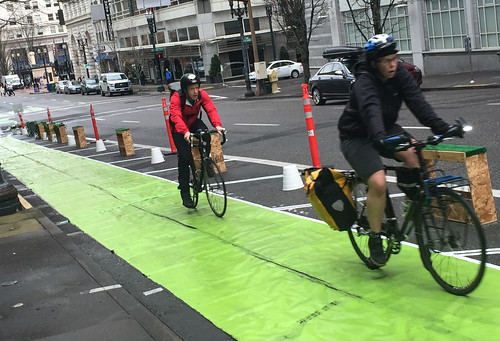
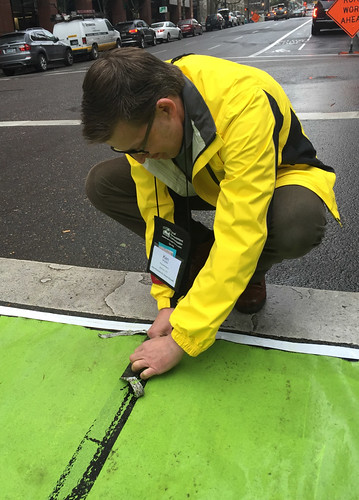
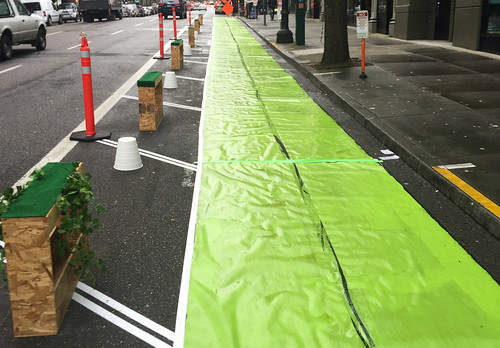
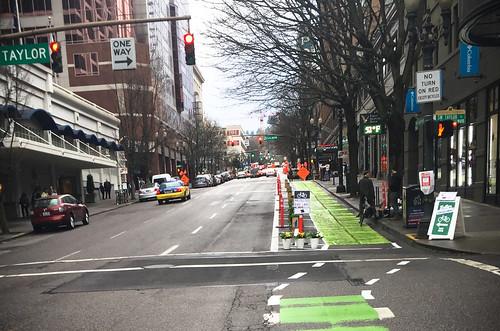
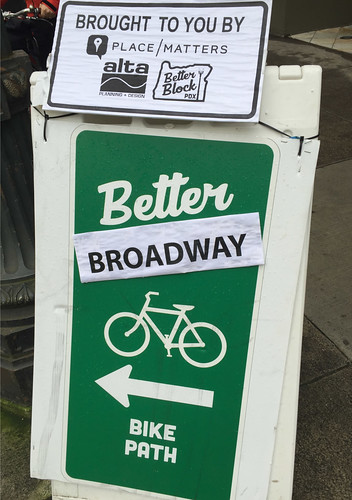
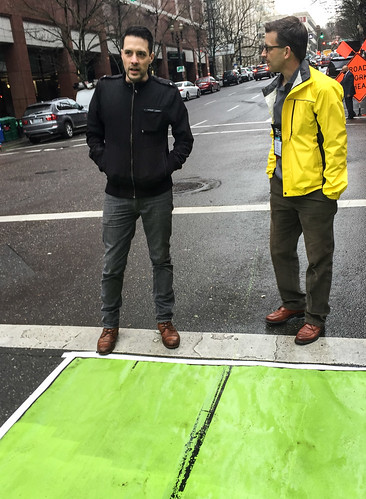
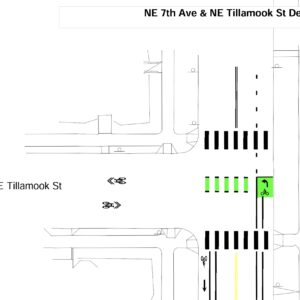

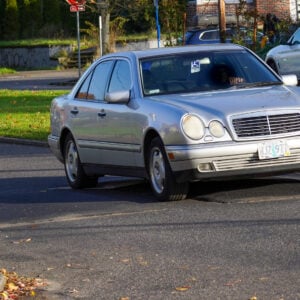
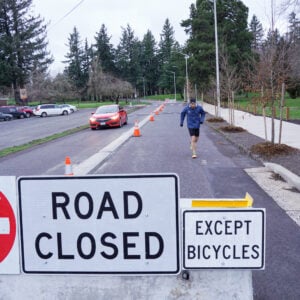
Thanks for reading.
BikePortland has served this community with independent community journalism since 2005. We rely on subscriptions from readers like you to survive. Your financial support is vital in keeping this valuable resource alive and well.
Please subscribe today to strengthen and expand our work.
Looks potentially slippery in the rain.
yes, but on the bright side, this is like a free version of that 1000′ slipnslide that came to town last summer
Sounds like the tape was particularly slippery, but maybe the roofing felt would be slippery even without paint since it’s meant to shed water. Maybe it would work with sanded paint? Barring an affordable non-slip material for the whole length, covering just the first 10 yards and any crossings might be feasible with something like an outdoor carpet or rubber mats.
It looks like the green helps people know they can bike through it, where orange cones tend to cause people to take detours when they’re spotted a block or more away. Covering or painting the orange cones/bollards with bike green might help too (and maybe the DOTs will even get the picture and start using the same for bike spaces/detours in work zones.)
Who knew that on-the-street parking was really storage units for cars?
I really want to be part of this biking community here in Portland, but the anti-car attitude really just kills it for me and really hurts the ability of this website to attract new followers, readers, and contributors. I’d be a willing $ contributor to this site if I was not continuously bombarded with messages that my car ownership and operation was a selfish act intended to hurt or harm others. Whether it’s bogus characterizations like the one I cited above or the many, many commenters who make car owners unwelcome here, it’s clear that someone like me who drives and also commutes by bike is not welcomed here.
And to simply characterize what I detect here as merely an anti-car attitude is really understating the environment here. It probably explains much of the perceived hostility in my comments here.
Can we please tone down the car and driver hate here? It is unreasonable, it doesn’t persuade other non-bikey folks, and, thusly, serves to push away those you need to realize your shared vision for comprehensive bike networks, safe bikeways, and safer streets.
I understand how you feel BeavertonRider. I drive too! I have 3 kids and a minivan.
My/our intention is not to be “anti-car.” The intention is to accurately describe the existing situation.. .we just happen to describe in an unconventional way that you migth not be used to. I apologize that it feels means to you. I would love if we could all tone down the “car and driver hate”. That’s a great idea. I am always careful with the words I choose and I hope everyone else is too… And I also will continue to describe our road use policies in a way that might sometimes feel over-opiniated because I’m trying to help people understand a larger point and share a different perspective.
I respect the fact that you don’t intend to be “anti-car,” and indeed I think you generally do a very respectable job of encouraging respectful dialogue while pushing for transportation reforms. But you know as well as I do that there are several frequent commenters here who truly are explicitly and unapologetically anti-car, and that these comments threads frequently have a clear anti-car tone.
I know this is a point that I and others have made in the past, both to you privately as well as in this forum, but I think the broader point BR mentions is worth repeating. I too have considered becoming a paying supporter of this site, but too often I find myself frustrated with the general attitude of the echo chamber this site supports, and I need to take breaks from participating. I know you’re not responsible for the opinions of your readership — and again, I do appreciate your respectful moderation of the conversations — so maybe this comment is better directed to the community at large.
I think BikePortland has the potential to be much more than the self-congratulatory echo chamber of complaints typically found in its comments sections. Unfortunately, those comments sections tend to drive away those would-be readers who would love to explore bike commuting and the cycling community generally but who also drive and/or believe cyclists should generally be more mindful of traffic laws. The power in a site like this is to attract a broad readership with diverse opinions but united by the spirit of cycling advocacy, who together can start working toward some cultural shifts. But when the conversation is dominated by the more radical voices — which is, of course and unfortunately, a self-reinforcing trend — a community loses its breadth and robustness.
I guess I’m not suggesting or asking for anything in particular here — I know the BikePortland staff will continue to produce valuable content and be a necessary voice in the Portland community, and I’m not about to ask passionate cycling advocates to pipe down. I suppose I’m just renewing my request that members of this community be mindful of how their tone and tactics affect others’ propensity to join the cause.
What cause would that be?
There are many areas here where groups of people, not just individuals, have widely differing opinions. Bike lanes, transit and parking are easy examples.
It’s common practice to tell anyone challenging to status quo to calm down.
Certainly, this site brings forth a wide diversity of opinions and priorities, and I think that’s healthy. Regardless, I think it’s safe to say we’re united by the common cause of making cycling in Portland safer, easier, and more accessible, even if we sometimes disagree on how exactly to go about that.
Of course there will always be resistance to those who wish to change the status quo, but that doesn’t change the fact that those who want to effect change should be mindful of their tactics and tone. I’m of the opinion that effective change is best achieved through incremental progress by a wide base of people with shared broader goals, who recognize that it takes a dose of humility and respect to attract people to the cause. By contrast, those who declare the status quo to be fundamentally unacceptable and demand an immediate revolution seem not to realize that there’s just as many people demanding the opposite revolution. I think these attitudes succeed only in emboldening their ideological enemies and further polarizing the discussion, which helps nobody.
Thank you for saying that Ian. I couldn’t agree more. Just to give you an example of the challenge we face in making sure EVERYONE feels welcome and comfortable in this space, consider that this morning I am exchanging comments with people on Twitter who say the anti-bike sentiment is too strong by some commenters and it’s scaring people off.
So I’m hearing this from both sides.
That being said, there are constraints on our ability to influence people’s comments.
This is a site about cycling so it naturally attracts more people who are passionate about cycling — and often less excited about driving and the impact of cars on their lives.
Believe me, my #1 intent on BikePortland is to build a broad and welcoming of a tent as possible. That’s good for our mission, which is good for the community.
I abhor the echo chamber and take active steps to avoid it in everything I do with BikePortland.
I really appreciate this feedback and will keep it in mind for the future.
Thanks.
“Believe me, my #1 intent on BikePortland is to build a broad and welcoming of a tent as possible.”
I do believe that, and I very much appreciate it. The last thing I want is for you to feel a need to be heavy-handed about regulating the tone or content of comments here — this community derives its power from the passion of its participants, and that passion certainly shouldn’t be discouraged.
I’m not sure exactly what kind of change I’m calling for here, aside from perhaps a broader recognition that certain attitudes and behaviors are self-reinforcing in a community like this, in a way that may be making our goals harder to achieve. I intend to continue to defend BikePortland generally, and you in particular, from those who accuse the BP staff of systematically silencing dissenting opinions, because I see how hard you work to make this an inclusive and productive community. I guess I just want the site’s users to be aware that this site doesn’t exist in a vacuum, and that public perceptions — both of this site in particular as well as of the broader cycling community — affect all of us.
Thanks, Jonathan. I appreciate thr follow-up.
I can appreciate being unconventional, but when the unconventional does not accurately reflect the situation, then objectivity is lost, accuracy is lost, and debate cannot happen.
Thanks, again.
Cars are objectively bad for cities and for the planet. Designing cities for cars instead of for people has proven to be a disaster. 30,000 people a year in this country die from car crashes and that’s not even including deaths from inactivity, pollution, etc. Cars take up a lot of space, and building infrastructure to store them costs money; money that could be spent on more housing units instead. Cars also require massive amounts of oil extraction and mining, none of which are renewable. Building highways for cars divides cities and neighborhoods and displaces people from their homes, while not solving any of the traffic problems it means to fix.
By the way, the owner of this website drives a car, so your argument that this site is purposefully “anti-car” falls flat. What you’re seeing is people coming to this conclusion by themselves. When you factor in all the issues I mentioned above, it’s hard not come to the conclusion that cars are bad. We as a society needs to be driving FAR less than we are today and that can only come from redesigning our cities to be more walkable and bikeable while expanding and improving public transport systems. I’m willing to bet that most of us here legitimately care about fixing our cities and not starting an anti-car war. We need to work together to fix these problems, not create rifts.
“We need to work together to fix these problems, not create rifts.”
Agreed — and to that end, I’d argue that beginning your comment with over 100 words arguing that cars are a scourge on society actively alienates the huge number of people who would love to advocate for better bike infrastructure but who still, for better or worse, use cars in their daily lives. It’s possible to advocate for cycling safety and facilities while leading a car-heavy lifestyle; it’s comments like these that dissuade such people from participating in forums like this.
There is a stark difference between being “explicitly and unapologetically anti-car” and hating on people for driving. I am not shy to admit I am the former. But in no way do I intend to publicly shame individual people simply because they happen to own and drive a car. It is possible to argue against a thing or concept without insulting the people who use it.
Car use and ownership is not a completely free choice. Our government has spent the past 60+ years making sure driving is easy and cheap while diverting funding away from other modes. The areas where it is possible to get around without a car are becoming increasingly unaffordable for a majority of people. This is forcing them into car-dependent areas, even if they don’t want to be there. Sure, some people want to live in car-dependent suburbs and they need to be called out that their personal choices are dangerous. But understand that it’s not always a personal choice.
I don’t see anything wrong with telling people the truth about their driving habits. The hope is that maybe they will make an effort to drive less. If someone is doing something bad, shouldn’t they be informed about it? Whether or not they have the means to make a personal change is a separate issue, but at least they will have the knowledge.
However, this problem must be addressed at a systematic level, not at the personal level. People make choices based on the context they exist in, not in a vacuum. The context is created by the government, and it is the government that needs to make the change. All the personal choices in the world can’t make up for the damage our governments have done.
Cars are bad. The people that drive them are not. Fight the system, not the people.
It may be possible to argue against cars without insulting the people who use them, but you come awfully close when you make blanket statements about cars being evil and about drivers who enjoy driving them being “uninformed.”
I guess this is the upshot of my argument: I don’t necessarily disagree with all of your opinions about car culture, but my personal opinion is that the way in which you express those opinions is detrimental to the movement. Do you really think you’re convincing anybody to alter their lifestyle to cut down on car use by telling them that their car is a death machine, that they’re ignorant for not realizing “the system” is against them, or that they should be mad at “the government” for not immediately and comprehensively upending transportation infrastructure as we know it?
Yes, reform is necessary — of both the infrastructure and of attitudes regarding transportation choices — but I don’t think your attitude is convincing anybody other than those who already agree with you. Indeed, I believe such attitudes do the movement a disservice by turning away those who would otherwise like to take part in effecting the sort of incremental change that would actually produce results.
All fair points. Admittedly, subtlety is not my strong point. My primary goal here is to point out problems that I see. If that convinces people to change their mind, then great. However, keep in mind that this is a a self-selected pro-bicycle blog, so you have to play the audience.
Indeed — the readership is increasingly self-selected to be that small group who aren’t put off by incessantly negative, hard-line stances and who are ok with alienating the more moderately minded folk who might want to be sympathetic to the cause but are turned away by attitudes such as yours. If that’s what you want, so be it — I’m not saying those sorts of close-knit activist communities shouldn’t exist. But if, like me, you have any interest in seeing this particular community be more welcoming to a diversity of opinion and more inviting of a broader support base, we might consider being more mindful of our collective tone.
In particular, as another user recently commented, all of your comments seem to contain some sort of dig, complaint, or otherwise distasteful slant, of the sort that makes it easy to discount even those comments of yours that include opinions I would otherwise agree with. I don’t particularly like that fact, and I like to think you might not either, so it may be worth occasionally taking a step back to ask yourself if your comments are benefiting the broader Portland cycling community or just making yourself feel better for voicing your own deeply felt opinions. Clearly, you’re not alone in your opinions here, but I have to wonder if this community is more interested in attracting the support to help effect real change, or rather just providing a platform for anti-car activists to agree with each other?
Not really sure how a “dig” is defined, other than a specific point you may not agree with, in which case, you’re entitled to that disagreement. I strive to avoid any personal attacks and instead work towards responding to specific arguments and coming up with solutions to problems. The comments here are for harboring discussion, not for recruiting people to a car-lite lifestyle. Bike Portland is not an advocacy organization.
If it were me personally, if I were doing things that were damaging, I’d want to be called out on it, so I could change my behaviour. In fact, I have done this many times in the past. If we can’t have honest discussions about people’s actions and the impacts they make, then how are we every going to change for the better as a society?
“If we can’t have honest discussions about people’s actions and the impacts they make, then how are we every going to change for the better as a society?”
I agree, and I hope you respect that it’s in that spirit that I’m now trying to voice my opinions about your tone, which have been developing for a while. That is, if we can’t have an honest discussion about the tone adopted by the most vocal elements of a community, how can we expect to address the fact that that tone is discouraging people from participating in the community?
For example, this is the first time I’ve participated in a discussion here in a few months, and it still feels just unwelcome enough that I’ll probably not waste my energy here again for a while after this. And that’s speaking as someone who already leads a low-car, cycling-heavy lifestyle — how do you think someone who drives to work but wants to start biking more would feel about participating in this community? I think it’s a bit striking how many “recommendations” my comments get relative to how many people are voicing similar opinions — why do you think that is?
I know this isn’t the first time somebody’s called you out for your off-putting negativity on here, and something tells me it won’t be the last. I’m certainly not asking you to stop contributing — your passionate voice is a valuable one, and I respect your dedication to the cause. I’m just suggesting that, as one of the more active voices in this community, you have the agency to move the tone of the conversation toward one which BeavertonRider would be more inclined to participate in. And s/he’s not alone in wishing this community could come across as less of a radical think tank and more of a… well, community.
Thanks for the feedback. Just to reiterate that my goal here is not to “recruit drivers”, nor do I speak for the entire community. My opinion is that for “someone who drives to work but wants to start biking more”, there are far better outlets for that than Bike Portland. The BTA has some great programs, as well as Pedalpalooza. In person, I strive to be welcoming to all people, but that nuance is easily lost when commenting online. It might surprise you that I am indeed friends with people that own cars! 😉
I strive to keep my comments focused on solving problems with our transportation network and city design. Some people may not like my direct tone, and that’s okay. I certainly welcome your constructive criticism and appreciate your expressing your opinions. I am always open to having honest discussion here.
I would encourage everyone to read this comic on tone policing: http://everydayfeminism.com/2015/12/tone-policing-and-privilege/
“What is Tone Policing?
“Tone Policing is a silencing tactic.
“That means it’s part of a set of tools used by people holding privilege to prevent marginalized individuals or groups from sharing their experiences of oppression.
“Tone policing works by derailing a discussion by critiquing the _emotionality_ of the message rather than the message itself.”
Ian: I’m not saying you’re wrong. I’m saying that focusing on the tone of a message derails the conversation from more substantive issues and makes it harder for people to share their thoughts and experiences. I’m confident that the BikePortland community already puts a great deal of effort into dancing around motorists’ sensitivities.
One could argue that I’m engaging in tone policing myself here, since I’m explicitly not arguing that Ian is wrong. To that I would say that motorists are privileged and that Ian is therefore arguing on behalf of a privileged group (regardless of whether he’s a member of it). Privileged groups, i.e. people who wield power, need to be flexible in what they tolerate from others, more flexible than they are with themselves and their advocates.
That’s an interesting point. I’ll admit that comic made me a bit upset, because I recognize I’m probably guilty of the sort of “tone policing” it describes (or at least, guilty of having such attitudes about these discussions, whether or not I choose to voice that opinion).
Here’s the crucial difference I see, in particular as it relates to this discussion: I read that comic to be accusing those in a position of power and privilege of shutting down conversations by attacking tone rather than content. By contrast, I’m not speaking to a community of cyclists as a driver who can’t relate to their needs. I’m a daily cyclist and infrequent driver who’s just as vulnerable as any other cyclist, and who feels deeply that, as cyclists, we have a responsibility to share the road respectfully and hold ourselves accountable to follow the same laws that we demand drivers follow.
As a member of the cycling community, it’s deeply distressing to me to see how polarized the cars-vs-bikes culture is, even in a city like this that’s objectively more bike-friendly than a vast majority of American cities. As such, I feel a conviction to encourage my fellow cyclists to conduct ourselves, both in our words and our actions, in a way that helps to mitigate that polarization.
If somebody can’t criticize a group’s tone from within that group, then who can? Is tone irrelevant? Personally, I find that notion tough to swallow.
“We” can’t hold “ourselves” accountable to anything. That’s an impossible standard, frequently brought up in social media to put down cyclists as a “group”.
I hold myself accountable to traffic laws when I bike. But we can’t control the behavior of all cyclists, and I find it tiresome to hear about how ‘we’ need to ‘regulate ourselves’. As if there’s a group meeting or a mailing list.
Fair enough. I’m just suggesting that we each hold ourselves individually accountable, and encourage others to do the same in any appropriate forum. Just because we’re members of a larger disconnected group doesn’t mean our individual actions don’t affect others’ perceptions of that group — perception that, I argue, affect us all.
There’s a difference in saying, “hey, we should really be following the law” and asking for more enforcement for scofflaw cyclists. If our goal is Vision Zero, cyclists are way down on the list for causes of death. Let’s tackle the primary causes first.
You’re right, there is a difference, which is why I find it baffling and frustrating when I get shot down for making the former statement. Vision Zero is an important goal, but it’s not the only goal. It wouldn’t take much effort to take the moral high ground by leading by example when insisting that drivers respect the law.
Thanks for sharing that! Definitely eye-opening. This is relevant not just on bike issues obviously, but for most issues facing us today.
“…they need to be called out that their personal choices are dangerous.”
There is always at least one “dig” in your posts. Believe it or not, it is possible to live and work in the suburbs.
Cars are not bad. They are tools, a means to an end. Not the only tool, just the dominant one.
Cars don’t hurt people, some of the people who drive hurt people.
Yup — and most of the people who drive don’t hurt people. Similarly, some of the people who ride bikes willingly flout traffic laws without regard for the anti-cyclist attitudes those behaviors engender, while most of the people who ride bikes do so safely and respectfully. Maybe we should spend more energy identifying our allies and less energy looking for enemies.
Some people who drive don’t flout traffic laws or endanger other people, but today 21 of them are on video doing it near me and my child on a bike in less than an hour of time on the street (this is about typical and doesn’t even count the unenforced speeding everywhere.) Cars are fine when used appropriately but they generally make Portland a more unpleasant place to be given that so few drivers use turn signals or respect stop signs or speed limits, let alone common sense like not driving on the wrong side of the road into oncoming traffic or over hills and around curves.
I believe those attitudes are predominantly the result of the “othering” of vulnerable road users by the motoring majority. I also believe that people who chastise or berate “jaybikers” reinforce harmful stereotypes.
You believe that people who chastise cyclists for not following the law are “reinforcing harmful stereotypes”? What about the harmful stereotypes that are being reinforced by cyclists breaking the law in the first place? Your resistance to the notion that cyclists should be held accountable for their actions never ceases to amaze me.
Many people are injured or killed by “legal” driving while “lawbreaking” by people cycling typically harms no one.
Leaving aside the fact that cyclists can and do injure pedestrians, the main thrust of my argument is that unlawful and disrespectful cycling habits *do* harm me by reinforcing drivers’ negative attitudes toward cyclists, and that, as a matter of principle, it’s hypocritical of us to hold drivers to higher legal standards than we hold ourselves.
I recognize your argument that likelihood of bodily harm should guide our selective enforcement of a law given limited resources, and while I don’t necessarily disagree with that statement as such, I don’t think that overrules our responsibility to share the road respectfully. I know this is a point we frequently disagree about, and to be honest it’s an argument I’m not really interested in continuing with you, so I hope that maybe we can just agree to disagree and try not to engage each other further on the topic.
This is the same argument made against any marginalized group. People are not individually responsible for the majority’s views of their group, nor are they responsible for positive representation of their group in the eyes of the majority at all times. If the majority have a negative opinion of a group, that is the sole fault of the majority for holding and enforcing that view.
“If the majority have a negative opinion of a group, that is the sole fault of the majority for holding and enforcing that view.”
I fundamentally disagree — we absolutely have the agency, through our words and actions, to affect others’ perceptions of us. That agency may not be as comprehensive as we may like, but the point still stands. Insisting that we, as blameless victims, have no responsibility to maintain a respectful level of discourse is the surest way to sabotage our efforts.
Cars hurt people even when operated safely. We focus on the one violent external cost of driving: crashes—which only a small minority of drivers cause, but the greatest external cost of driving is pollution. Everybody who drives contributes to the collective hurt that car pollution causes, which affects everybody, and kills more people than crashes do. Another external cost is the reallocation of space away from people and towards private property that happens to support the car-centered infrastructure that has been imposed on our cities and towns. If you drive, your car relies on this infrastructure, though we all pay for it. That hurts people too, by limiting their travel and housing options, by degrading accessibility for those who don’t drive.
I’m not saying everyone should give up their cars; I’m challenging whether a hegemony of car-centered infrastructure is acceptable. People are free to drive, but it would be nice to recognize the implications of driving on the scale that we do on this planet, and to stop kidding ourselves that it’s OK. It’s not OK.
When I drove and owned a car, I knew most of this already. I didn’t feel insulted, but I did lose my taste for daily driving over time. Eventually, I drove so little that it didn’t make sense for me to be a car owner, although such ownership is priced at such a bargain that I could easily have kept my car.
Facts are facts. I can’t avoid hard truths to avoid offending anyone. Come to your own conclusions, but I can’t sugarcoat anything for you.
When I drive I cause less pollution than when I bike. And I say this as someone who has no personal need or desire for motorized transport for any of my local trips.
If your bike is causing that much pollution, you really need to find a more sustainable food supply.
I didnt say the site was anti-car. I wrote that there’s an anti-car attitude here that puts me off from becoming more involved and financially supporting the site.
I think we agree that cars present hazards to people and the climate, but we certainly disagree how to resolve that hazard and also on what potentially could happen were we to devote less governmental dollars to roads. For example, I dont think reducing spending on car infrastructure should be redirected to affordable housing as I dont agree that’s a legitimate government function relative to public safety and education at the local and state levels and national defense, public safety at the national level.
“I wrote that there’s an anti-car attitude here that puts me off from becoming more involved and financially supporting the site.”
This reads to me like somebody claiming they would start biking to work if they didn’t get so sweaty. I have a hard time believing that you can be a regular reader and poster here and haven’t found a reason to contribute financially, but that you would if some attitudes were changed.
Adam, I think your prolific comments are one of the things BeavertonRider is talking about.
I agree with BR but would like to point out that the comments that show fairness to all modes typically get more “likes” than those that are blatantly anti-car. Much like other areas of life, I think most BP readers are more moderate than the vocal minority of extremists would suggest.
Agreed. I just wish BP’s moderate majority would speak up more often, if only to make it harder for others to pigeonhole BP as a radical community of unreasonable cyclists whose opinions they don’t need to take seriously.
It’s hard to not be radical when the vast majority of drivers think it’s radical idea to ask that drivers pay their fair share, stop killing tens of thousands of people every year, and contribute to bike/ped infrastructure that is only necessary because of cars.
Depends on how you define “radical”. I personally don’t see wanting safe places to ride a bike, not wanting people to die in traffic, and wanting to stop climate change as particularly radical viewpoints. Subjectivity, I suppose.
It’s not so much the cars we hate, it’s the inattentive, careless people driving those cars.
Based on other comments in this thread, if we’re talking about things that “we” hate, it would appear to be both. So how about “we” just start toning down on the hatred in general?
You should check out the comments over on Oregonlive. Things are very tame here by comparison.
Sure, but that’s an awfully low bar. It’s a sad state of affairs when a community feels a sense of accomplishment for being more civil than an OregonLive comments section.
That one earned a Muttley LOL. Congratulations sir.
“We” don’t “hate” someone simply for driving a car, but “we” certainly “hate” drivers who purposefully harass and abuse other road users. Clearly, there is a threshold that must be crossed.
There’s a difference between being anti car and anti the way things are about cars right now. The fact that it’s clearly bad that 99% of people think they have to use a car every time they travel more than three blocks doesn’t equate to a war on cars or whatever, it’s just the logical response to a climate of personal automobile ownership that is so toxic that it’s creating noticeable problems with the way people operate.
I don’t think one has to be anti-car to see that the existing situation, with bike lanes shoe-horned into the incredibly dangerous door-zones, is completely unacceptable and has been done only because we give cars an unearned special place on our public property. People who choose to ride bikes are given the choice of riding in a proven dangerous place, in the door zone, or riding in the adjacent travel lane and being harassed by the very prevalent bike haters.
So, we’ve got a recipe for a dispute. If we are going to increase ridership, we can’t continue to have bike lanes that are failures by design. In order to fix that, we have to either remove on-street parking, remove travel lanes, or widen the right of way. Only two of those are even remotely in play and they both impinge on those special privileges motorists have come to see as something they are entitled to.
Is it anti-car to be pro-bike? Maybe so, at least on this issue, but it’s also right and proper.
It’s good to find out where the problem really lies. It’s counterproductive to complain about people who are simply going along with the system. It’s not their fault the system is not working.
I find it better to point the finger at the design of a street rather than the people who are simply trying to go down it in one way or another.
But please don’t feel shut out of any “community” just because there are nasty comments on a website.
You generally get a lot of likes… I appreciate your point of view although like many conservatives, you seem to like to be a victim…..
I’m curious to see this in person tonight on my ride home if it’s still in place. This treatment is much needed on the entire length of SW Broadway though I fail to grasp why they needed to put this surface down for the entire length of the lane. Experience has demonstrated that if you clearly mark the lane at entry points (intersections) this will prevent cars from thinking they belong there.
Ironically enough the lack of bike lane markings in the “parking protected” section of SW Broadway just south of this stretch is likely why so many vehicles enjoy curbside parking at the expense of bicyclists.
As this is a one-day temporary project to get people interested, making it as visible as possible makes sense.
Like the “Protected Bike Lane” sign. Good way to tell motorists what that green color on the pavement means. Education, education, education!
That reminds of the bicycle stencils that are typically used in the US for different types of bike facilities. I wish we would/could just use the stencil shown on the bicycle sign (as is done in most of the western countries), especially for our bike lanes and protected cycle ways. Instead, we usually get that mushroom head stencil that, to me, is not only ugly but also looks much less professional. It doesn’t make sense that signs and sharrow markings can use the other stencil, but actual designated bicycle facilities need to use this one.
This is great! Looking forward to riding in it this afternoon! Keep up the great work, Alta, BetterBlock, Place Matters! I love that PBOT is so helpful here. It shows that they do really care about improving the situation on our streets. Hoping this becomes permanent soon!
Here’s a video of the installation in action, from Alta Planning + Design’s FB page:
https://www.facebook.com/altaplanning/videos/10154008786649225/
http://www.bizjournals.com/portland/blog/real-estate-daily/2016/02/pdc-gives-the-go-ahead-to-build-26m-parking-garage.html
Despite the utopian BS spouted by some, cars aren’t going anywhere. There will be more electric cars over time, but cars themselves will be the primary mode of transportation for the super majority of people in our lifetime. Vision zero needs to be attained with that inescapable reality in mind. Much better to be pro-bicycle than anti-car. The likelihood of getting sh*t actually done is much higher.
Of course cars won’t go anywhere if we keep constructing massive buildings to house them in!
Which would you rather have, massive buildings to house cars in or street parking that can’t be converted into protected bike lanes because there’s nowhere else to put the cars? I realize you’re arguing for fewer cars in general; I’m not sure what your realistic plan is for approaching that utopian model, but you need to face the fact that those cars aren’t going anywhere in the near term. People aren’t going to get rid of their cars until those alternatives are already in place.
If our goal to reduce reliance on private automibiles, then building parking structures in dense city centers is counter-intuitive to that goal and will only induce more car demand. Especially since this is mere feet from a light rail station. The alternatives may not be great metro-wide, but in this example, the parking structure is literally across the street from rapid transit. If we want to reduce car usage, we need to stop building places to store them. No one is arguing for a car-free utopia, but building using the argument that “cars aren’t going away” only becomes a self-fufilling prophecy.
I don’t have the link at the moment because I’m gathering material for my own blog, but there was an article in the last few weeks about knowing there will be parking available at your destination is what really induces demand for travel by motor vehicle.
Still plenty of space there for on-street parking/loading/delivery areas next to the bike lane, instead of that third thru lane. Would also let you put a curb extension/island at the crosswalk to shorten the effective crossing distance for people walking!
I own and drive a car, but I don’t get all butt hurt when someone mentions that their overuse has destroyed our communities and is ruining the ecosystem.
Yeah, this is the thing. I have a car too, and I think I and many other car owners tend to overuse them. A lot. It is occasionally appropriate to use a car, but not nearly to the extent that we, as a society find ourselves using them. I think “The System” encourages this by making driving so darn cheap and easy—and by (seemingly actively) making every other mode vastly less easy.
We should (IMO) focus on the overuse aspect more than anything else. Draw comparisons to things like using a chainsaw to carve a turkey, or eating nothing but Fast Food—ever, things like that.
I agree. It’s about the best tool for the job.
Most of my trips are 5 miles or less, so I end up riding my bike or walking. I drive my car less than once a month. I moved here fifteen years ago from the south, where freeways and sprawl rule, and everyone drives everywhere all the time because there aren’t any other reasonable options. Here it makes little sense for me to drive, because biking is far less hassle than making my way across town in a car on streets crowded with vulnerable users. Biking is more fun too, and I can almost always park directly in front of my destination.
Thanks for the design – I really like it. In the materials test vote I would say this plastic sheeting is not optimal. I rode in the rain this morning and its very slippery.
The best time to have built a cycle track from Hollywood District to PSU along Broadway would have been in 2009. The 2nd best time to build this would be 2016.
Tracks are for racing. Let’s just make a bikeway.